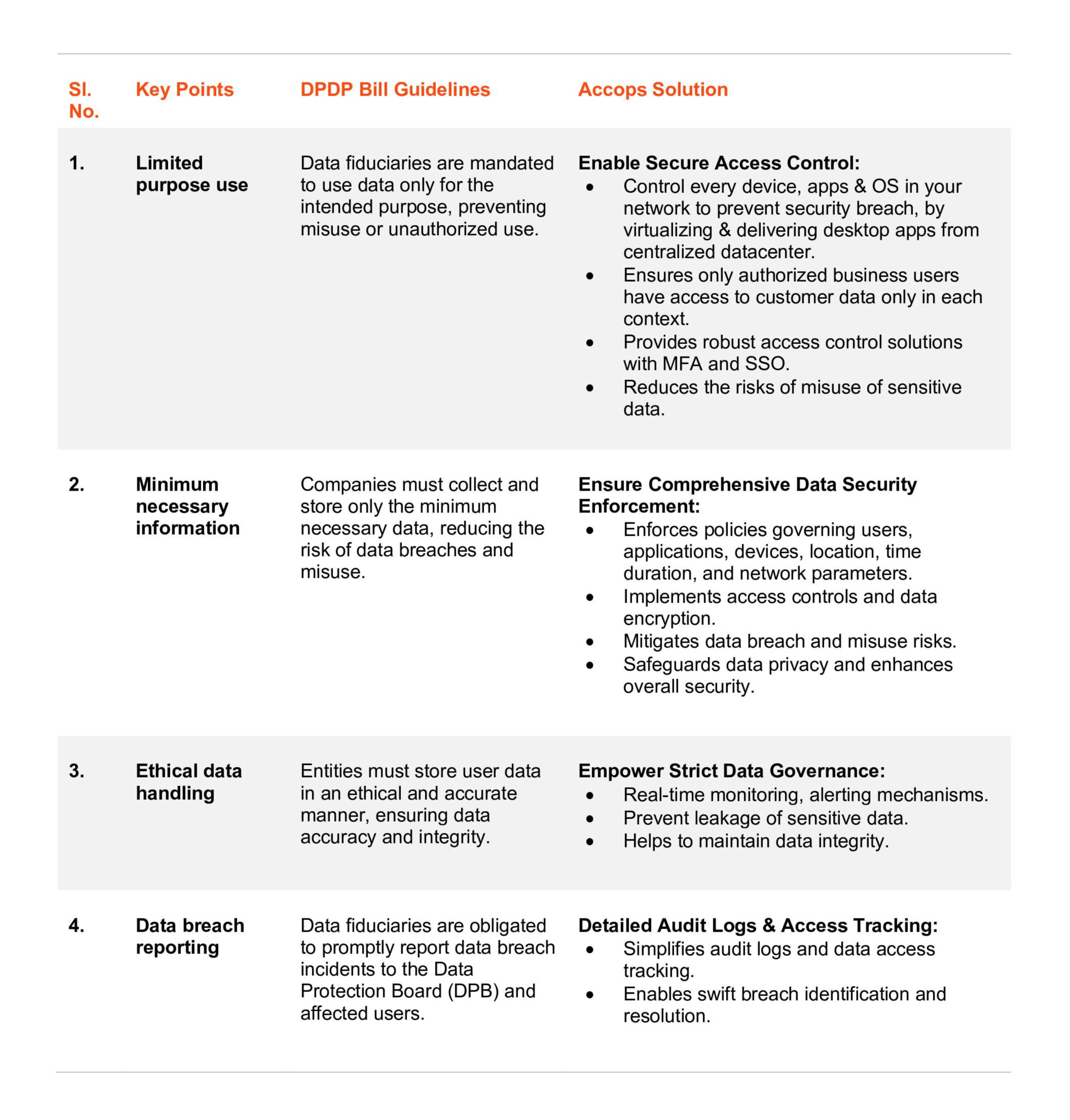In today’s swiftly evolving digital realm, personal data isn’t just a collection of bytes and bits. It encapsulates individual identities, chronicling their experiences, choices, and the trust they place in the digital infrastructure. Every transaction, every interaction, and every click is a chapter in the vast anthology of personal data narratives.
Thus, safeguarding personal data has become paramount. The Digital Personal Data Protection (DPDP) Bill 2023 is a significant step towards protecting the personal data of Indian citizens in the digital landscape. This comprehensive legislation addresses various facets of data protection, aiming to give individuals greater control over their personal information. In this blog, we’ll delve into the key highlights of the DPDP Bill, its objectives, and how Accops plays a crucial role in meeting the criteria.
The Need for the DPDP Bill
As the internet increasingly becomes an integral part of daily life, personal data has emerged as a valuable commodity. Indian citizens have lacked adequate control over their personal data, leading to concerns about privacy and security. The DPDP Bill addresses this gap by establishing a legal framework emphasizing data protection, governance, and compliance across various sectors.
Objectives of DPDP Bill 2023
The DPDP Bill 2023 sets forth several objectives to ensure comprehensive data protection:
- Protecting citizens’ rights: The primary objective of the bill is to safeguard the rights of Indian citizens by establishing a robust framework for data protection.
- Compliance-friendly regime: The bill seeks to create a conducive environment for startups and digital economies to operate while adhering to data protection standards.
- Defining government access: The bill clearly defines situations under which the government can access personal data, particularly for law enforcement and national security purposes.
Breakdown of Key Points
All entities handling user data to deliver products and services are termed ‘Data Fiduciaries’ under the DPDP Bill. This designation applies to organizations collecting personal data for purposes like service provision, research, or product marketing, signifying their role in determining data processing objectives and methods.
The DPDP Bill introduces several significant points to enhance data protection:

Accops’ Role in Data Protection under DPDP Bill
In an age dominated by digital footprints, Accops stands out as a guardian of data integrity. Consistently advocating for businesses to retain control over their proprietary and customer-centric data, Accops’ legacy is rich with adherence to global data regulations, like GDPR, RBI, HIPAA, EPCS, GLBA, and more. With the introduction of the DPDP Bill, Accops continues its mission, now fortified to address the nuances of this new regulatory landscape.
Accops: A Pioneer in Secure Workspace Solutions
Accops is not just a solution provider but an ally in an organization’s journey towards comprehensive data protection. Our unique approach integrates the fundamentals of the DPDP Bill, encapsulated by the six Ws and one H:
- Who: Ensure stringent user authentication, ensuring that only vetted individuals access applications and customer data.
- What: Enable tailored access based on user profiles and roles, optimizing utility while bolstering security.
- Which: Permit data access from only authorized devices, with the added provision that each user can access from a single device, eliminating potential data access breaches.
- Where: Ensure that users access data from only approved or known geographical locations.
- When: Make use of intricate monitoring capabilities, tracking when users log into applications and for how long, offering insights into user behaviour.
- How: Defining secure access pathways, be it through LAN, WAN, designated IP pools, or whitelisted IP ranges.
Going Beyond with Accops
- Fortified Data Security: Accops emphasizes robust access controls and endpoint protection measures to stave off unauthorized access and potential data leaks. With its contextual access system, access privileges are dynamically adjusted, granting resources strictly to those who are authorized, ensuring data sanctity. Moreover, using the Accops product suite, organizations can run critical apps in an isolated environment, concealing them from users’ devices and networks. And virtualize and deliver them from a centralized data center or cloud.
- Prompt Breach Notifications: Awareness is the first step towards mitigation. Accops excels in offering real-time monitoring and maintaining detailed audit logs. With these, organizations can swiftly identify any discrepancies and, in the unfortunate event of a breach, can act promptly, mitigating potential damage.
- Secure Data Transitions: In today’s interconnected world, data flow is constant. Accops offers functionalities that prevent potentially risky actions like copy/pasting, file transfers, and even capturing screenshots. Such features are crucial, especially when considering the DPDP Bill’s stringent data transfer guidelines pertaining to foreign entities.
Conclusion
The DPDP Bill 2023 is a crucial step towards safeguarding personal data in the digital age. Accops’ suite of secure workspace solutions provides organizations with the tools they need to meet the requirements of the bill and ensure comprehensive data protection. As this legislation comes into effect, individuals, startups, and businesses can rely on Accops to uphold the principles of data privacy and security, contributing to a safer and more transparent digital ecosystem.
For comprehensive information of our products and solutions, please visit the Accops website or contact our experts directly.

